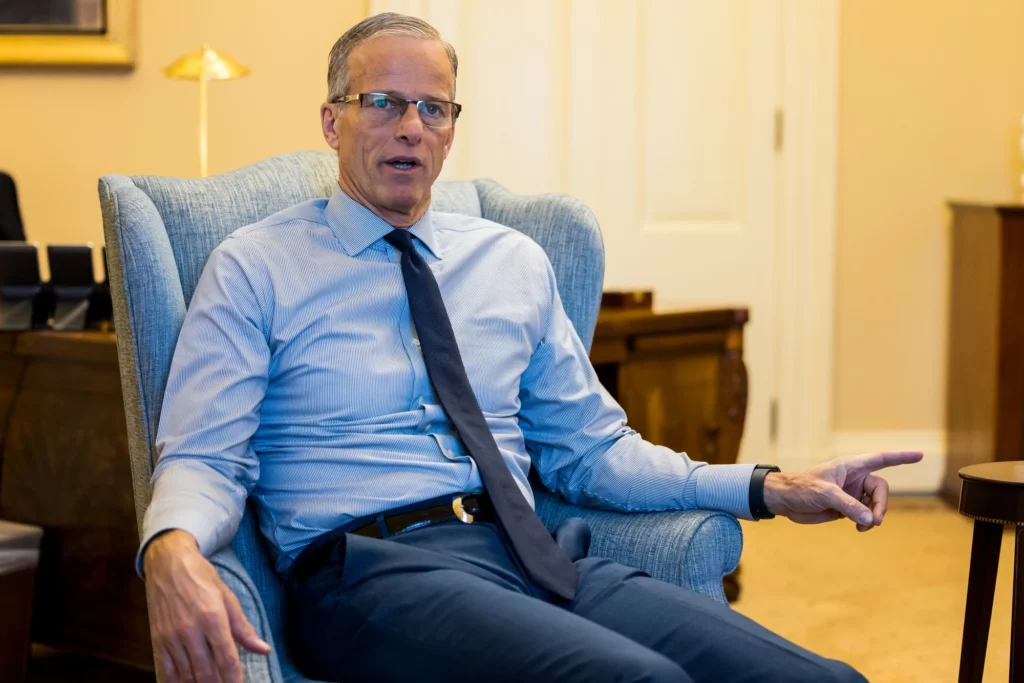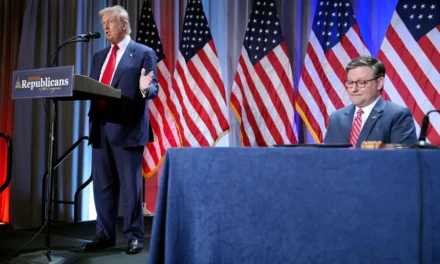We support our Publishers and Content Creators. You can view this story on their website by CLICKING HERE.
Senate Republicans are falling behind schedule on President-elect Donald Trump’s Cabinet nominees as administrative delays threaten to push back the date of confirmation hearings on Capitol Hill.
Senate Majority Leader John Thune (R-SD) is under pressure to get most of Trump’s nominees ready for a vote by the time he is sworn in on Jan. 20 or shortly thereafter. But paperwork holdups, including slower-than-expected FBI background checks, could get in the way of that time frame.
The delays have sparked tensions in the Senate as Democrats accuse Republicans of needlessly fast-tracking the process.
Thune told the Washington Examiner he wants to return to the “Obama standard,” in reference to the dozen nominees the Senate confirmed under former President Barack Obama during his first two weeks in office.
“I think it’s important we get back to the Obama standard, where the president ought to have the chance to get their folks in place and get them in there in time to actually be able to implement his agenda,” Thune said in an interview on Monday.

“I think that’s going to be the way we’re going to be approaching nominations. We’re going to move fast aggressively, and hopefully, we’ll see what kind of support we get from the Democrats, but we need to get [Trump’s] team in place,” he added.
Only a couple of nominations are expected to be confirmed on Jan. 20, with insiders pointing to Sen. Marco Rubio (R-FL), Trump’s nominee for secretary of state; Rep. Elise Stefanik (R-NY), his pick for U.S. ambassador to the United Nations; and CIA director nominee John Ratcliffe as contenders.
That is in large part because Democrats can prevent Republicans from expediting the process on the Senate floor, but simple paperwork is also proving to be an obstacle.
“We’ve been facing an uphill battle getting complete background checks and the Office of Government Ethics forms done for some nominees,” a Senate GOP aide said. “Unfortunately, that has delayed the process a bit.”
GOP senators discussed whether they could advance Trump nominees without required paperwork such as financial disclosures, according to a source familiar. Office closures due to winter weather at the Office of Government Ethics this week have delayed the process.
Thune has signaled he will give GOP committee chairs the space to use their discretion on how to process the nominees under their jurisdiction.
Some committee leaders are attempting to press ahead and set dates without full documentation in hand, and others are taking a slower approach.
Sen. Mike Lee (R-UT) moved to schedule a Jan. 14 hearing for energy secretary nominee Doug Burgum despite objections from Democrats who said they had not yet received Burgum’s paperwork.
Sen. Martin Heinrich (D-NM), the panel’s ranking member, called the hearing notice “a breach of precedent and protocol” because it was done without minority consent.
“I am extremely disappointed that Chairman Lee has scheduled the first Senate Energy and Natural Resources Committee confirmation hearing over my objection and before basic information has been given to the Committee,” Heinrich wrote in a statement.
“For decades, nominees that have come before the ENR Committee have submitted responses to a standard questionnaire and a completed financial disclosure form, approval from the Department’s ethics office, and completion of an FBI background check,” he added.
Lee called Heinrich’s statement a delay tactic and claimed Burgum submitted his paperwork to the Office of Government Ethics last week. Republicans generally counter that all documentation will be received by the time of the hearing.
“The committee has the same amount of paperwork that Energy and Natural Resources Committee Democrats had in 2009 when they noticed confirmation hearings,” Lee said in a statement provided to the Washington Examiner. “I, as chairman, have made every effort to work with our Democratic colleagues, but we won’t give in to delays that undermine the American people’s mandate.”
A number of chairs are operating more methodically. Sen. Bill Cassidy (R-LA), who is leading the Senate HELP Committee, said he couldn’t give a definitive timeline for Linda McMahon’s confirmation hearing to lead the Department of Education.
“It really depends on us getting paperwork,” Cassidy told reporters on Wednesday. “Right now, the hold seems to be on their side.”
In some cases, the delays are marginal. Senate Judiciary Committee Chairman Chuck Grassley (R-IA) hoped to hold a hearing for attorney general nominee Pam Bondi on Jan. 14, but the proceedings were delayed a day and scheduled for Jan. 15 and Jan. 16 instead.
Bondi’s background file and financial disclosures had been holding up the process, according to a Judiciary aide.
Trump’s pick to become the director of national intelligence, Tulsi Gabbard, is also facing delays. Sen. Mark Warner (D-VA), the top Democrat on the Intelligence Committee, is refusing to expedite a hearing due to a lack of vetting materials. As of Wednesday evening, those materials were still forthcoming.
Sen. Tom Cotton (R-AR), the Intelligence Committee chairman, has been aiming to convene hearings on both Gabbard and Ratcliffe ahead of Trump’s inauguration on Jan. 20. A hearing has been set for Ratcliffe on Jan. 15.
The delays come as Cabinet nominees continued to blanket Capitol Hill on Wednesday. Robert F. Kennedy Jr., Trump’s nominee to lead the Department of Health and Human Services, met with Sens. Cassidy, Maggie Hassan (D-NH), Jim Banks (R-IN), Warner, and Bernie Sanders (I-VT).
Pete Hegseth, Trump’s nominee for defense secretary, met with Sens. Grassley, Jack Reed (D-RI), and Bernie Moreno (R-OH).
CLICK HERE TO READ MORE FROM THE WASHINGTON EXAMINER
After an hourlong meeting with Kennedy, Cassidy wouldn’t say whether he would support the longtime environmental lawyer and vaccine skeptic’s nomination to HHS on Wednesday.
“We had a frank conversation,” Cassidy said, speaking with reporters following the meeting, adding that they spoke about “every permutation of vaccines.”

 Conservative
Conservative  Search
Search Trending
Trending Current News
Current News 




